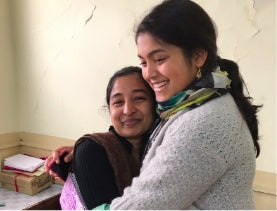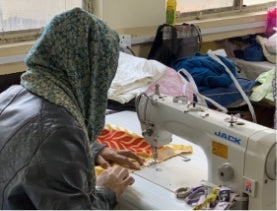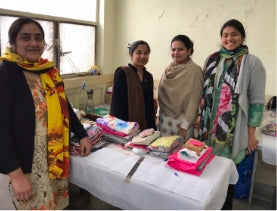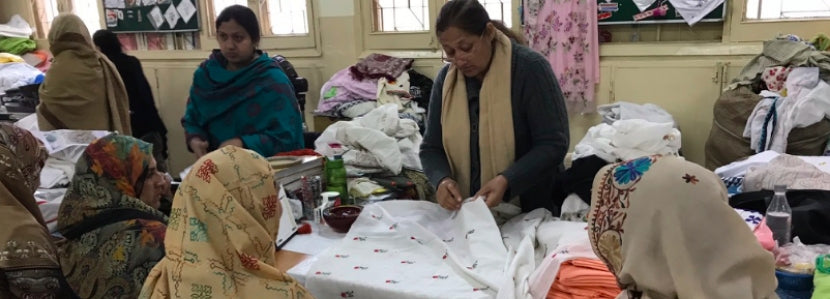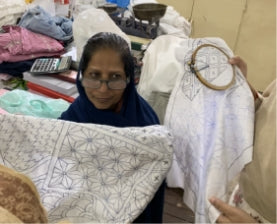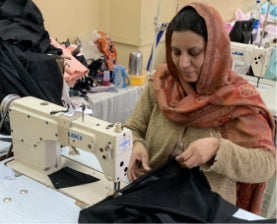
Fauzia A.
Although many in her society value boys, Fauzia A. always says “thanksgiving to God that I have four daughters!” Growing up, Fauzia’s parents could not afford to send her to school; however, even as a child, she was so impressed by the educated people she encountered that she longed to be like them. She promised herself that even if she never had the same opportunity, she would ensure an education for her children. However, the average public school in Rawalpindi has a very poor curriculum, and most teachers never even show up. So, in order to give her daughters a quality education, they would need private schooling. However, Fauzia’s dream was impossible with her sitting at home and stitching for neighbors and friends. There simply wasn’t enough work, and she could only afford to send just one of her four girls to school. So, at the reference of a friend, she joined Behbud to give equal opportunities to all her girls.
As a tailor for Behbud, Fauzia makes an average of 5-6 pieces per day. She has a loving relationship with her husband, Muhammad, and credits their partnership as the reason for their success. The money he earns covers their living expenses, but isn’t enough to educate their children. So the money Fauzia earns from Behbud, goes straight to funding their daughters’ educations. It is their shared belief that a good education is essential for all women, but it’s her financial independence from her husband which has allowed them to give their girls a future. Today, her eldest has graduated high school, gotten married and begun pursuing further education. Additionally, it has been Fauzia’s lifelong dream to learn English; because of her encouragement, now all four of her children can speak it fluently. Fauzia herself is being taught English by her 11 year old daughter. “You should always have a passion for learning,” she says, and Behbud has allowed her to fulfill each and every wish for her smart girls.

Afida K.
Afida K. currently lives in Rawalpindi and learned to sew from her mother. After her brother’s marriage,15-year-old Afida stopped doing embroidery jobs at home, and went to work to help her father support the family. When she first started at Behbud, Afida knew the basics of embroidery but had little experience. Now, after 30 years, Afida is called “artist” by the other workers and is respected as the official expert in embroidery and stitching techniques. She often uses her love of nature as inspiration for embroidery designs and has made many stunning scarves with scenes of her garden and home on them.
Afida separated from her husband and lives with her four sons and two daughters-in-law. She feels Behbud was instrumental in helping her build both her own life and her family; “Behbud is everything to me...It is the reason that I am standing on my own two feet, the reason I could build my home, the reason I married two of my sons and a daughter.” According to Afida, Behbud has allowed her to fulfill all the desires of her children and allowed her to gain more skill in her craft so that she could be a professional working woman.

Afshan R.
When Afshan R. first started at Behbud, she was living with her parents, who had financial issues, so Afshan went to work to help support her family. Family friends introduced her to Behbud 10 years ago, and Afshan has been hand embroidering ever since. After marrying 6 months ago, Afshan currently lives with her husband and in-laws. Behbud, she says, has given her mobility and independence so that she can help support her family.
When asked what she wants to do in the future, Afshan replied “I am so much stressed and worried all the time I am not thinking about these things; what I will do in the future or what my family will stay in the next five or ten years. I am so busy in the current situation circumstances that are right now.” It is this mentality of dealing with the present, which has led Afshan and so many women to Behbud. With no time to daydream about the future, they must work hard to support themselves and earn the income they need. The advice Afshan wants to give all women, is to be independent. Looking back, Afshan wishes that she had educated herself and studied hard, so that she could get and even better job and earn more to support her family. When, and if, she has children Afshan promised herself, “I will educate them well so their future will become bright.”

Naseem B.
Naseem B. has been working for Behbud for five years and is responsible for hand embroidery. Depending on how detailed the pattern is, it takes Naseem anywhere from 15-30 days to do one embroidery piece.
Before Behbud, Naseem was a housewife and wasn’t able to earn anything for herself. Her mother taught her to sew when she was younger, but Naseem only embroidered for family members and never got paid for her hard work. She was motivated to join Behbud after her husband couldn’t work anymore. On top of that, her two sons separated from their wives and her family began facing serious financial issues. She needed extra income to support both herself and them. The money Naseem earns from Behbud goes towards buying groceries, clothing, medicine and other basic needs for her family. Behbud allowed Naseem to gain the financial independence she’s always craved, and because of her skill, she is the sole breadwinner in her family. “Behbud is a positive effect in my life...because of Behbud, I can meet my needs and my husband’s needs without asking [anyone for help].” Her advice to all women is to learn the skills necessary for each job, so that you can earn your own money and be independent in life. That way, even if you have a problem, you will be strong enough to face it on your own.

Saima Z.
Saima Z. started stitching bags when she was just 9 years old. She was very young when she got her first job making bags from abroad, and Behbud liked them so much that they offered her a position. Saima accepted, and has been working for Behbud for the last 14 years. Her experience at Behbud has given her the opportunity to learn more about her craft and enhance her skills. She is so experienced that now she can see a picture of any bag and make an exact replica.
Saima currently lives in Rawalpindi with her husband, daughter, and two sons. Her biggest goal was to secure her daughter’s education, and as a result of the income she earned from Behbud, Saima was able to give all her children a quality education. Her daughter is currently 24 years old, married and is a teacher. Saima’s two sons are 18 and 21 years old and both are studying. One of her sons, is also interested in making bags, and helps her out with her work from time to time. During her time at Behbud, she has become very close with fellow interviewee Sunita M. Though Saima was the expert and originally assigned to supervise Sunita, over time Saima has become not only her mentor, but Sunita’s closest friend. Sunita looks up to Saima as a mother, and they continue to learn from and support each other everyday.

Sunita M.
Sunita M. is 28 years old and has been working for Behbud for nearly ten years. Before joining Behbud, she was completing her studies in the 10th grade before the untimely death of her beloved father. In addition to the grief, she knew her family would suffer financially if they did not have more income. So Sunita decided to go to work to help her brother support their family. In the aftermath of her father’s death, Sunita’s first days at Behbud were very sad; “I was always crying and had little confidence in myself” since, at the time, Sunita knew nothing about stitching bags. But Behbud taught her everything she needed to know so that she could make a living. Now, Sunita is a stitching teacher and also Saima Z’s assistant.
Saima has been a very happy influence in Sunita’s life and is thought of by Sunita as not just a mentor, but as a mother. Because of Behbud, Sunita is living a good life. She is surrounded by good people in a safe and happy environment at Behbud; and because of Saima’s and Behbud’s support, she has become more confident both in herself and her abilities. Now she is a happy, independent woman. It is her hope that one day, she can be an expert, like her teacher: “Saima says she has the best student, and I believe I have the best teacher.” Sunita currently lives with her sister, brother, sister-in-law, and mother. When asked what she hoped to achieve for herself, she said she never once thought of herself, “Everything is for the family, and I want to give them a better life by earning.” Sunita’s goal is to have her sister get married “to a good man in a good style,” and to earn enough to take care of her mother as she gets older. Her advice to women, is to “never lose hope,” and to the girls who are not allowed to work, “try again and again.”
Irshad K.
After completing the 10th standard in her school, Irshad K. did a course on tailoring and drafting (hand embroidery and machine embroidery). She was so talented that she placed first in the course and won a prize for her accomplishments. Sadly, her father passed during her last year of studies, leaving twelve children behind. Irshad, the eldest, could not afford to pursue her education with eleven younger siblings to support, so she went to work. She was first introduced to Behbud in 1973, when a doctor from Behbud’s Medical Clinic asked her and her cousin if they needed jobs. Irshad started right away, earning very little the first few months. Over the years, because of her extraordinary skill, Irshad has risen up to become the supervisor for the embroidery department.
The money Irshad earned from Behbud has allowed her to handle the financial burden of taking care of 11 younger brothers and sisters. Irshad was so busy trying to make ends meet—working for Behbud in the day and growing veggies for a big farm at night—that she always thought about the future of her younger siblings, not herself. Because of this, she says, she is unmarried. But she happily reports that all her siblings are now grown and married. Irshad lives with her youngest brother, his wife, her nephew and two nieces. Her only dream in life has been to provide her siblings with food and a good education, and because of Behbud, it all came true.
